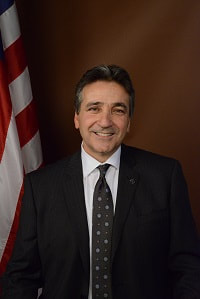|
STATE HOUSE – The House of Representatives today unanimously approved Speaker Nicholas A. Mattiello’s legislation to strengthen Rhode Island’s outdated law on bombs and other explosive devices.

The legislation, which now proceeds to the Senate, addresses loopholes that have hindered the filing of charges following incidents involving explosive devices, such as one last month when a pressure cooker bomb was discovered off Hopkins Hill Road in West Greenwich.
“Much has changed since our explosives law was written in 1957. Today, unfortunately, the threat comes from powerful improvised explosive devices, and law enforcement needs to be able to spring into action before a potentially lethal incident occurs. These updates are needed to protect Rhode Islanders from the threats that exist in today’s world,” said Speaker Mattiello (D-Dist. 15, Cranston). The bill (2018-H 8156A) is a bipartisan effort, cosponsored by Senior Deputy Minority Leader Anthony Giarrusso (R-Dist. 30, East Greenwich, West Greenwich) who had called for a review of the law following the incident in West Greenwich. “This is all about preventing a tragedy here in Rhode Island,” said Representative Giarrusso. “This is a difficult topic to legislate but if the current laws fail to address these new circumstances we need to update them. You cannot just arrest people for buying things that may be considered bomb-making materials like nitrogen fertilizer or pressure cookers, but we cannot ignore the fact that home-made explosive devices are being built in our state.” The legislation updates the existing law to protect against improvised explosive devices (IEDs) in several ways. First, it expands the definition of explosive devices to include any device intended to explode. Current law applies only to traditional bombs and explosives, so police can’t use it to charge individuals with IEDs. Second, the bill adds possession of such devices to the law as an offense punishable by three to 20 years in prison and fines of $1,000 to $10,000. Current law punishes only those who actually place a bomb or explosive somewhere, so even if someone is caught heading somewhere with a backpack full of explosives, they cannot be charged under the current explosives law. Additionally, the bill eliminates a part of the law that limits its application to devices placed “in any public or private building, or area where persons may lawfully assemble.” The language could stand in the way of charges being brought for bombs placed in tents, sheds, vehicles and outdoors and other settings that might not fit that definition. Finally, the bill allows charges to be brought against those possessing the “readily converted” components of an explosive device. Under current law, charges can’t be brought unless the device is fully assembled, so someone setting up an explosive device could escape charges any time before they’ve connected the final wire to the battery of the IED. The bill is carefully crafted to allow people to possess components for lawful purposes, since many of the components of IEDs are everyday objects such as nails and pressure cookers, as well as legal pyrotechnics and firearms items. Rhode Island’s laws regarding explosives lag those of neighboring states, such as Massachusetts, where pressure cooker IEDs were used to carry out the Boston Marathon bombing in 2013. The legislation is supported by the Rhode Island State Police. Other cosponsors include House Majority Leader K. Joseph Shekarchi (D-Dist. 23, Warwick), House Deputy Speaker Charlene M. Lima (D-Dist. 14, Cranston, Providence) and House Senior Deputy Majority Leader Kenneth A. Marshall (D-Dist. 68, Bristol, Warren).
Contact Information
Larry Berman Communications Director for the Office of the Speaker Rhode Island House of Representatives Minority Office Rhode Island State House, Room 331A Providence, Rhode Island 02903 (401) 222-2466 |
nEWS & MediastAY CONNECTEDSign up below to receive the latest News & Media from the Rhode Island House Republican Caucus sent directly to your inbox.
FIND NEWSXSOCIAL MEDIA |
Learn More About Us |
Constituent Services
|
State Government |
About rhode island house republicans
In 1636, Roger Williams, founder of Rhode Island, established the first working model of Democracy after being banished from Massachusetts for his “extreme views” concerning freedom of speech and religion. Thomas Jefferson and John Adams publicly acknowledged Williams as the originator of these concepts, along with the freedom of public assembly, in the First Amendment in the United States Constitution. Today, Rhode Island House Republicans uphold the liberties designed by our Founders and preserved in our Constitution, and are the primary legislative body promoting lean government, fighting for lower taxes, and advocating for initiatives and policies that improve the economy and in turn, the lives of Rhode Islanders. As members of a part-time assembly, we are small business owners, retired educators, community activists, lawyers, farmers, military service veterans, volunteers, former local officials, retired social workers, coaches, musicians, churchgoers and board directors -- bringing these community engagement and professional experiences to our work, on your behalf, at the Rhode Island State House.
2024 Rhode Island State House Republicans | 82 Smith Street, Room 106 Providence, RI 02903 | 401..222..2259 | Email Us


